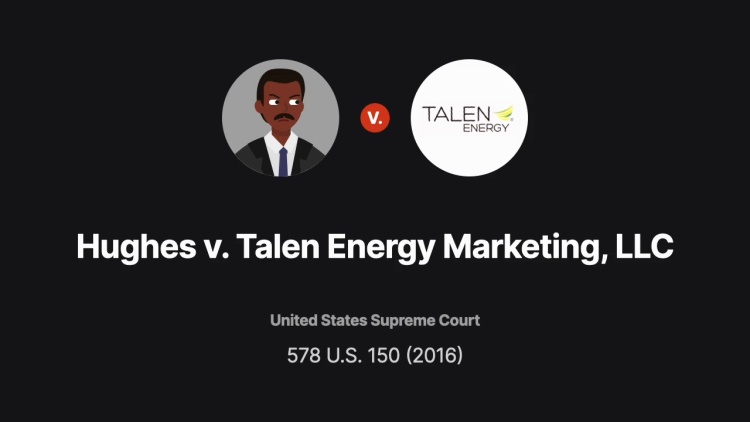Hughes v. Talen Energy Marketing, LLC
United States Supreme Court
136 S. Ct. 1288 (2016)
- Written by Robert Cane, JD
Facts
Pursuant to the Federal Power Act (FPA), the Federal Energy Regulatory Commission (FERC) implemented an auction-based-market mechanism to ensure just and reasonable wholesale electricity rates. PJM Interconnection (PJM) was a regional transmission organization that oversaw the electricity grid in parts of 13 mid-Atlantic and midwestern states. PJM regularly administered a capacity auction to set a clearing price for wholesale electricity. A clearing price was the price at which load-serving entities (i.e., entities that distributed electricity to retail customers) were required to purchase electricity from PJM. All capacity sellers received the clearing price for capacity, not their bid price, if they bid under the clearing price. In 2009, Maryland proposed to FERC that it extend the duration of its New Entry Price Adjustment rule, which guaranteed new generators a stable capacity price for their first three years in the PJM capacity auction, to 10 years. FERC rejected the proposal, reasoning that it would improperly favor new generation and throw the market-based price-setting mechanism of the capacity auction out of balance. Soon after, the Maryland Public Service Commission (Maryland commission) (defendant) selected CPV Maryland, LLC (CPV) (defendant) to construct a new gas-fired power plant and ordered load-serving entities to enter into 20-year pricing contracts with CPV. The contractual rate was a rate that CPV had specified in its accepted proposal. The pricing contracts were contracts for differences, which did not transfer capacity ownership to the load-serving entities. The contracts required CPV to bid in PJM capacity auctions. However, the contracts guaranteed that CPV would receive the contract price, not the auction clearing price. If the clearing price was higher than the contract price, CPV was to pay the difference to the load-serving entities. If the clearing price was lower, the load-serving entities were to pay CPV the difference between prices. CPV was to receive no payment whatsoever if its capacity failed to clear the auction, so the contracts encouraged CPV to bid as low as possible, which put downward pressure on capacity prices. Incumbent power generators (plaintiffs) filed suit against members of the Maryland commission. They sought a declaratory judgment that Maryland’s program was preempted by FERC’s exclusive authority to set wholesale electricity prices. The district court found in favor of the incumbent generators. The court of appeals affirmed. The United States Supreme Court granted certiorari.
Rule of Law
Issue
Holding and Reasoning (Ginsburg, J.)
What to do next…
Here's why 907,000 law students have relied on our case briefs:
- Written by law professors and practitioners, not other law students. 47,100 briefs, keyed to 996 casebooks. Top-notch customer support.
- The right amount of information, includes the facts, issues, rule of law, holding and reasoning, and any concurrences and dissents.
- Access in your classes, works on your mobile and tablet. Massive library of related video lessons and high quality multiple-choice questions.
- Easy to use, uniform format for every case brief. Written in plain English, not in legalese. Our briefs summarize and simplify; they don’t just repeat the court’s language.






